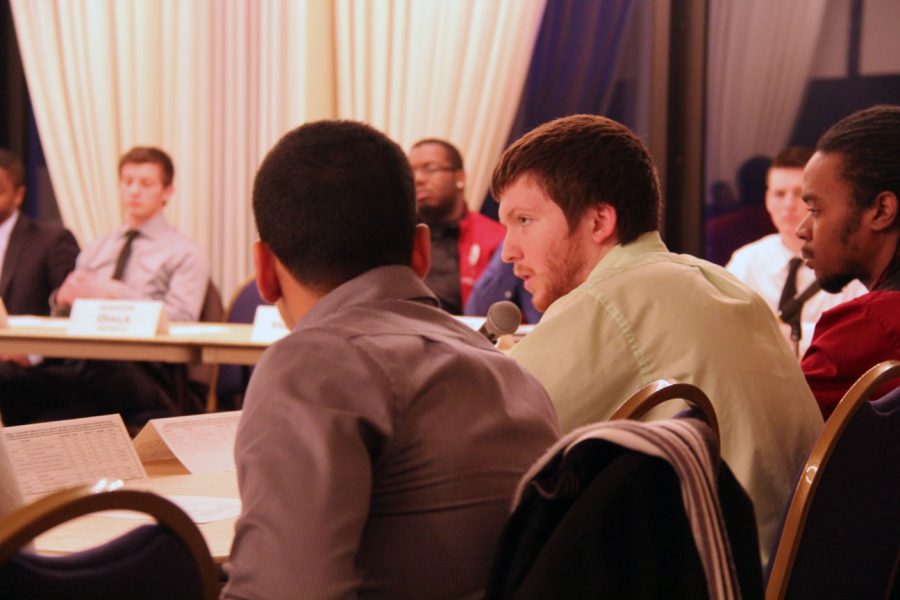Student Association wants role in program prioritization
Ben Donovan, Student Association director of Governmental Affairs, talks to senators at a Jan. 25 SA Senate meeting about a proposal to lower DeKalb’s bar entry age from 21 to 20. Donovan said the SA will give a statement about the idea at today’s City Council meeting.
February 16, 2015
The Student Association Senate criticized the exclusion of student input in program prioritization and the shared governance process in a resolution’s first reading Sunday.
The resolution, authored by Ben Donovan, SA director of Governmental Affairs, states excluding students from the task forces that evaluate university programs would violate NIU’s commitment to shared governance. It ends by expressing the SA’s “diminishing faith in the shared governance system as it is currently practiced.”
Program prioritization has the goal of ensuring all programs are in line with NIU’s mission and vision. Task forces made up of faculty representatives from all seven colleges and faculty and staff representatives from all 10 divisions will evaluate each program to determine whether it should be cut, merged with another program, decreased or increased in size or given more funding.
Provost Lisa Freeman said students will have a say in the criteria the task forces uses as the criteria will be subject to review by the Academic Planning Council and the Resource, Space and Budget Committee, which have student members. But, no students will serve on the task forces themselves to protect them from possible retaliation for the actions of the task force, Freeman said.
But, the resolution quotes the NIU Constitution as also saying “that all discussions and deliberations regarding program elimination be as open and inclusive as possible.” Program elimination is a part of what the task force will be discussing. The SA’s position is that in order for the discussion to be “as open and inclusive as possible” per the university’s guidelines, students must be involved, according to the resolution.
“What we have in the status quo is students who are, as outlined in the constitution, an integral part of the university’s system of governance being left out of a prioritization process that is supposed to be as open and inclusive as possible,” Donovan said. “I think that’s a really big problem.”
Donovan said the SA is “open to negotiation” as to a solution. But, he said one possible system would be to have two students — a junior and a senior — serve on the program prioritization task forces.
The senior would be a student involved in and knowledgeable about NIU’s governing system. He or she would train the junior to step into a leadership role. The next year the junior, now a senior, would train another junior, and so on in a rolling process.
Donovan said he understands NIU is excluding students from the task forces because of students’ short-lived stays at the university, but Donovan said whether faculty on the task force will stay at NIU isn’t guaranteed.
“I don’t think the status of students as a transient population is unique enough to the student body to warrant leaving them out,” Donovan said. “… If there’s a student who’s on the committee who could fully articulate the student position, I think that would benefit the task force immensely.”
The Senate had no questions or discussion on the resolution’s first reading Sunday and will hold a second reading and vote on the resolution at its next meeting. SA Senate will meet 6 p.m. Sunday in the Holmes Student Center, Sky Room.
Students “represent a significant portion of the stakeholders that will be impacted by prioritization,” Donovan said. “Whether that’s students who will be benefitted by certain programs gaining funding, harmed by programs getting cut, just being neutral if programs stay the same … we have a lot at stake in this process.”
Excluding students from the task forces would go against the spirit of NIU’s shared governance system, according to the resolution.
“There’s a huge difference between the students, you know, helping to come up with the criteria for evaluation … and having a student in those task force rooms, you know, on the inside, listening to the deliberations,” Donovan said.
Students are not the only group to be excluded from the task forces, Freeman said, as only tenured faculty are invited to serve. The task forces will work with confidential data that may lead to intimidation from outside forces that want that information, Freeman said.
“First, we think they should be focusing their efforts on those things which brought them to the university and not doing hard work in difficult recommendations to the university,” Freeman said.
Shared governance is not specifically defined in the NIU constitution, and while governance of NIU is supposed to be shared between faculty, staff and students, the role each group plays is not clearly laid out, Donovan said.
So, from a certain viewpoint, Donovan said, the process NIU is using to evaluate programs could technically be considered to be in line with the university’s commitment to shared governance.
“I think the argument would be: Well, students are involved instrumentally. They’re working kind of, you know, in an [adviser] role. And that would satisfy” shared governance, Donovan said.







